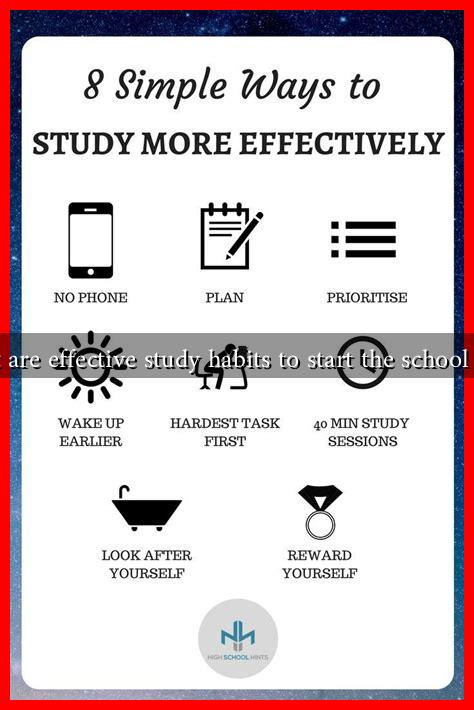-
Table of Contents
Effective Study Habits to Start the School Year
As the school year approaches, students often find themselves overwhelmed with the prospect of new classes, teachers, and assignments. Establishing effective study habits early on can set the tone for a successful academic year. This article explores proven strategies that can help students maximize their learning potential and achieve their academic goals.
Understanding the Importance of Study Habits
Study habits are the routines and practices that students develop to enhance their learning. According to a study published in the Journal of Educational Psychology, students who adopt effective study habits tend to perform better academically. This is because good study habits promote better retention of information, improved time management, and reduced stress levels.
Key Study Habits to Implement
Here are some effective study habits that students can adopt as they start the new school year:
- Set Clear Goals: Establish specific, measurable, achievable, relevant, and time-bound (SMART) goals for each subject.
. For example, aim to read one chapter of a textbook each week or complete all homework assignments on time.
- Create a Study Schedule: Develop a weekly study plan that allocates time for each subject. Consistency is key; try to study at the same time each day to build a routine.
- Utilize Active Learning Techniques: Engage with the material through summarization, questioning, and teaching concepts to others. Research shows that active learning can enhance understanding and retention.
- Organize Study Materials: Keep notes, textbooks, and assignments organized. Use folders or digital tools like Google Drive to categorize materials by subject or topic.
- Minimize Distractions: Create a dedicated study space free from distractions. Turn off notifications on devices and consider using apps that block distracting websites during study sessions.
- Practice Time Management: Break study sessions into manageable chunks using techniques like the Pomodoro Technique, which involves studying for 25 minutes followed by a 5-minute break.
- Review Regularly: Schedule regular review sessions to reinforce what you’ve learned. Spaced repetition is a powerful technique that helps improve long-term retention.
Case Studies and Statistics
Research supports the effectiveness of these study habits. A study conducted by the University of California, Los Angeles found that students who utilized active learning techniques scored 20% higher on exams compared to those who relied solely on passive reading. Additionally, a survey by the National Education Association revealed that students who set specific academic goals were 30% more likely to achieve higher grades than those who did not.
Incorporating Technology into Study Habits
In today’s digital age, technology can be a valuable ally in developing effective study habits. Here are some tools that can enhance your study experience:
- Note-taking Apps: Applications like Evernote or OneNote allow students to organize notes efficiently and access them from multiple devices.
- Flashcard Apps: Tools like Anki or Quizlet can help with memorization through spaced repetition and interactive learning.
- Time Management Tools: Apps like Trello or Todoist can assist in creating to-do lists and tracking progress on assignments and projects.
Conclusion
Starting the school year with effective study habits can significantly impact a student’s academic performance and overall well-being. By setting clear goals, creating a structured study schedule, and utilizing active learning techniques, students can enhance their learning experience. Incorporating technology can further streamline the study process, making it more efficient and engaging. As the new school year begins, remember that the habits you cultivate now will lay the foundation for your future success. Embrace these strategies, and watch your academic journey flourish.





